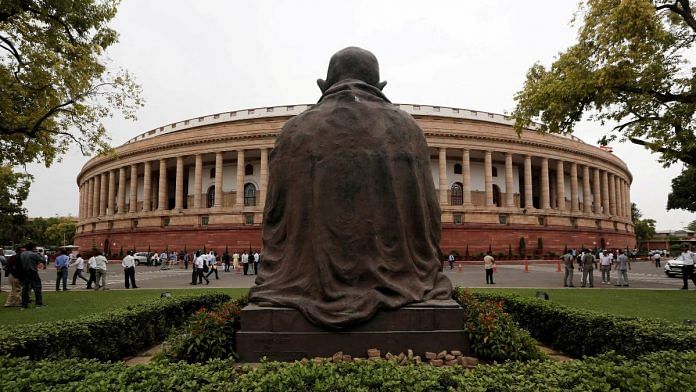
Thank you dear subscribers, we are overwhelmed with your response.
Your Turn is a unique section from ThePrint featuring points of view from its subscribers. If you are a subscriber, have a point of view, please send it to us. If not, do subscribe here: https://theprint.in/
Democracy is grinding work. Proprietary businesses and Defence forces may be ruled by dictates; democracies require negotiation, compromises, accommodation and concessions. Political setbacks are inevitable, victories are partial and often temporary. All politicians are frustrated with these constraints. They weather the barrage of inevitable criticisms. The truly democratic ones know it and accept them. Those of demagogic bent remain frustrated. You get all types in politics. Therein lies a paradox. Dangers in democracy – there are plenty.
Elected authoritarians find legitimate ways to subvert democracy. It is done slowly and unobtrusively with minor steps which usually enjoy a modicum of legality. They are approved by the legislature and ruled constitutional by the courts. Many of these steps are lauded as furthering public good like combating corruption, enhancing National security and improving the quality of elections and thereby democracy.
Today’s polities have agencies to investigate and punish public officials and private citizens who violate laws. These include the judicial system, law enforcement agencies, intelligence, tax and regulatory authorities.
In democracies, ruling Government often attempt to control these authorities to tilt the playing field in their favour. Though such attempts are always being made in all democracies all the time, complete breakdown of working democracies have only happened in a few small Latin American and African Nations. It is unlikely to happen in large democracies especially in those with a vibrant federal system and multiple political parties dominating regional politics.
Also, large democracies which practice free speech, will also have a free media, – or only partially gagged media – monitoring any attempt at subversion. The only exception to this is Russia’s Putin. But then the evolution of Russia as a “democracy” itself is convoluted and recent. As such we must treat it as an odd exception. The other danger, in entrenched democracies, is for ruling political parties or potential winner buying opponents off. Even media houses and leading businesses, influencers and critics are at risk of being bought off with either money, positions or undue favours.
In India we have many instances of these malpractices at the Centre and at state levels. After Independence there was only one occasion when democracy was subverted for a period of 21 months when the then Prime Minister Indira Gandhi declared a state of emergency across the country, citing imminent internal and external threats, under Article 352 of the Constitution. the Emergency was in effect from 25 June 1975 to its withdrawal on 21 March 1977. For much of the Emergency, most of Gandhi’s political opponents were imprisoned and the press was censored.
The Emergency is one of the most controversial period of Indian history since 1947. The good that came out of that nightmarish episode is that, India now is sure that it can never be repeated. Democracy in India The incredible India is a diverse Nation with many regional variations, religions, castes and languages. Soon after Independence the Western world including Britain thought that India would disintegrate into smaller states. But Indian politics under the Congress prospered and kept India united with power shared between the Centre and the State. But post the enforced “emergency” by Indira Gandhi the Congress party disintegrated and a series of weak Governments ruled at the Centre.
While the integrity of the polity strengthened, the weak Governments failed to improve the economy except for that genius act my Narasimha Rao Government with MMS as the finance minister in 1991. Alas, it was but a flash in the pan, as soon diverse politics took control of the state. Meanwhile China, under a monolithic government, prospered and galloped to become a reckonable economic power in the world. India, in comparison, by all standards remained economically a laggard.
The greatest challenge democracy faces in India is that it has failed to deliver the kind of sustained economic development enjoyed by its neighbour China over the last four decades. It has also failed to eliminate poverty completely, which gave rise to a sense in its people that a more purposeful government with a clear mandate might deliver more. Political parties in India, without exception, are parochial, clan based, caste based or Dynastic fiefdoms selectively pandering to the needs of some sections of the society.
In electoral democracies every political party will attempt to create a strong faithful voter base. THAT is a natural process. In such an environment it is difficult to separate the wrong from the right in Indian politics. Tailpiece: Over the years Governments have prioritized party over the Nation. When the priority is restored to the Nation some, including a section of the media and elites in society, raise the hackle of Nationalism, a la the Third Reich, further setting back development. Democracies, especially in the developing economies, require a rallying point for collective action – more so in diverse India where political parties seemingly function at cross purposes impeding homogenous development.
These pieces are being published as they have been received – they have not been edited/fact-checked by ThePrint.

COMMENTS